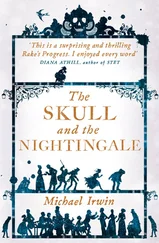The old man’s room was on the ground floor, not far from the kitchen. At first Marguerite spent most of her time in the kitchen, cleaning out cupboards and sitting in an armchair for perhaps hours at a time, staring out into the garden, waiting for him to summon her. As she started to learn the rhythm of his needs, she could afford to spend time exploring the many other rooms. She cleaned them, one by one, taking time to wipe away the blankets of dust over the sinks, the crisp shells of long-dead daddy-long-legs and centipedes in doorways.
He didn’t sleep well at night, but often during the day. Marguerite, by nature active but prone to sudden, consuming bouts of somnolence, profited from his naps. Her afternoons often passed by in dull and dreamless slumber, from which depths she would emerge only with great mental and physical effort.
She soon learnt to take these long sleeps early, so that the struggle to come back to the world, to her room’s bare walls and sparse furniture, was over in time to face the darkness – when it started to descend – with full strength and clarity. She realised quickly that she was afraid of the nights here, in this house that was never visited by anyone, that it was her charge to protect. The dark was as thick and complete as sleep.
When Jérôme called out or knocked hard on the wooden headboard, sounds that often startled her through the silence, she would go in with a glass of milk or water. At night, he’d stare into the darkness outside the windows before she drew the curtains shut. He might say, ‘Totally black, completely and utterly black,’ as if to himself; or, ‘You wouldn’t be able to see the devil if he were standing right outside,’ tapping his chin with one of his surprisingly beautiful, fine-boned fingers.
On one of those evenings she dropped the tray after placing a glass and small dish of pills by his bed. Its clattering on the stone floor was a shock to the quiet, and he inhaled quickly, gripping the sheets. When the clatter and its echo died he smacked her arm, pushed the glass aside so roughly that it almost fell too, and turned to face the wall.
‘I’m sorry,’ she said and he swiped the air without turning, gesturing for her to leave.
He began to speak more, emerging in bursts from his muteness to chide her for taking too long to respond to his calls, or to demand medication, or ask with suspicion what she would be making for dinner. Madame Brochon’s provisions hadn’t lasted long, and Marguerite took to walking to the village two or three times a week to collect post, fresh milk, medical supplies and – once he had started to talk – the odd request Jérôme might have for something unusual: pistachios, some batteries for his torch, a bag of blackberries.
The route from Rossignol was winding, the quiet road fringed for the most part by forest. Twice, she’d seen a startled deer sprint through the trees. She imagined wild boar and badgers rustling around in the undergrowth too: she knew they must be around here somewhere, since something was digging up great pits on Jérôme’s land. What were they digging for? She wanted to know these things, but there was no one to ask. She was unacquainted with the details of rural life: the names of trees, which birds had which call, whether the large oak at the bottom of the garden was dying. Familiar only with the countryside’s boredom and silence, she was determined in this job to get to know her landscape, to become self-sufficient.
The people of Saint-Sulpice were not rude, but certainly no one was friendly. Just as it was not an ugly village, but by no means picturesque. It was like the last place she had worked: too close to a town to be remote, too far to borrow any of its buzz. With the same disregard for the old and quaint that she had noticed throughout provincial France, dilapidated old buildings – in fact lovely in their faded hues of rust and lemon – had been spruced up with brazen, teak-bright trellises, garish with orange and purple flowers. A café that might, in Paris, have embraced the tattered charm it would have earned after several decades of service, was here the victim of ruthless stripping, whitewashing and primping. It was filled with the ubiquitous red and white checker of country tabletops; a flock of wooden ducks lined up in polite procession along the windowsills.
She didn’t see Madame Brochon on her trips into the village, but there was many a Brochon-like matron. The grande dame of the boulangerie refused, even after Marguerite’s seventh or eighth visit, to register recognition; she pursed her lips when Marguerite ordered her bread, as if tolerating a young child. But Marguerite had learnt in these places that it was a dangerous thing to look for hostility where perhaps there was mere indifference. She knew it was a trick of the lonely to favour the rude to the simply unmoved; that the loneliest thing in these villages and in this most tucked-away of professions was to elicit no response at all.
She visited the library in her third week. Jérôme had asked for a book to be read to him each night. She had just dried him after an evening bath, the time when he was at his most spitting.
‘Can you even read?’ he had hissed after bathtime’s habitual and adamant silence, punctured only by grunts of indignation and occasional discomfort. Her hands were by his ankle; she was trying to guide one bony foot through the gash of a pyjama leg. His feet were growing soft under her auspices. She rubbed them after every bath with oil, sensed the relief this gave him not in any active words of encouragement but in the absence of the contrary.
‘Yes,’ she said simply. One foot was through; she started on the other.
‘Well, I should think it would do you some good to do some reading,’ he said, wincing theatrically as she pulled the waistline of the pyjamas in one swift motion up to his knees. ‘ Careful! ’ he snarled. She inhaled, waited for him to speak again. There was silence. She pulled the soft flannel trousers past his knees – swollen bulbs where stray, sparse hairs stood upright among clusters of moles.
‘I should not mind ,’ he continued, looking resolutely at the ceiling as she pulled the trousers up past the shrunken bud of his penis, his soft, felt-like balls, the static fuzz of his white pubic hair, ‘if you would find something to read. Before I sleep.’
She tied the trousers’ drawstring in a gentle bow at his waist, smoothed the flannel shirt down over his belly. It was distended, hard as a drum. He flinched and flapped his hands.
‘All right, all right,’ he said. ‘Stop fussing.’ She stood and he put his hands on her arms and gave her his weight – considerable, in spite of his boniness – as she swung him gently onto his back, lowering him down onto the clean bedsheets.
‘Is there anything in particular you’d like me to read?’ she asked.
He frowned furiously. ‘It’s not for my sake, it’s for yours. Pick something you can read, only make sure it isn’t some ghastly romance. And I don’t want poetry. I want something with a real story, something noble. I used to enjoy the classics: Dumas, Hugo, Gaston Leroux. Albert Cohen, even. Just for God’s sake no romance or girly tripe.’ Then he added, ‘Whatever you think you could benefit from.’
And so she found herself two days later in the municipal library. It was as she had imagined, both dim and too bright. The librarian, young and sallow, stamped her books carefully and listed the rules of the place in a flat voice.
‘Returns must be made before twelve weeks have elapsed. Extensions can be made only by direct request in person and at the discretion of the librarian on duty. Care must always be taken to keep both food and liquids away from all books issued by this library, and in case of damage you should be prepared to pay a fine of up to twenty-five euros.’ Once he had reeled the rules off, he looked a little embarrassed. He secured his glasses, which had not slipped, with one finger, smiling faintly. His nails were chewed right down to the quick, a metro-map of veins across his hand.
Читать дальше










